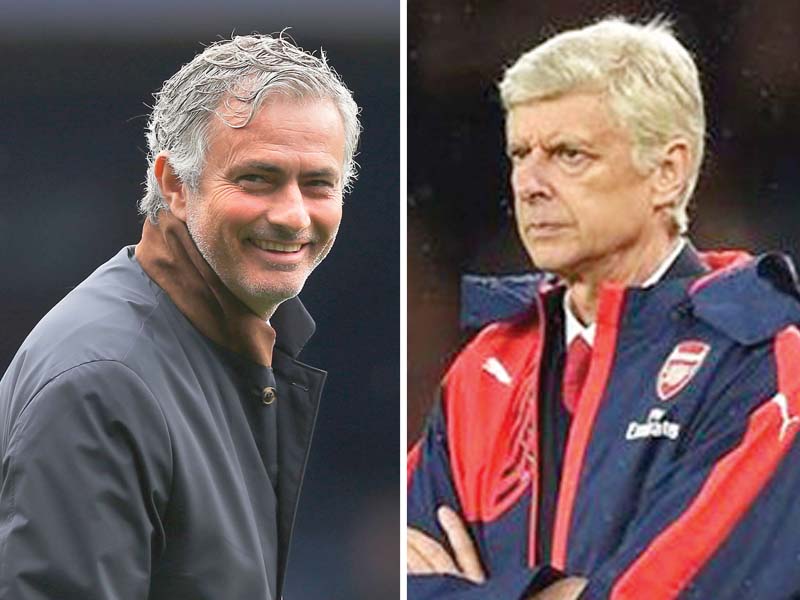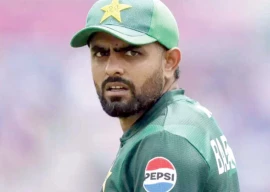
Saturday sees the renewal of what is arguably the bitterest managerial rivalry in world football at the moment, with Messrs Arsene Wenger and Jose Mourinho set to clash once again on the football field.
While both managers have had enviable careers so far, their career paths and footballing philosophies could not have been more different.
But what makes this rivalry so edgy is not their differences but their similarities — obsessive winners and
perfectionists both.
If football is more than just numbers and results, then Wenger takes precedence over Mourinho in terms of playing style. While Wenger has been trying to build on his time at Arsenal year after year — 19 years and counting — ensuring he leaves behind a legacy far greater than what his stats can ever suggest, Mourinho has been doing the exact opposite; jumping one ship after the other when two-year success is met with failure in the third.
Which of the two managers has had more impressive a career is a debate that will rage on till the end of time, with Mourinho boasting more trophies and a far better head-to-head record while Wenger has a far more lasting legacy with much fewer resources at his disposal.
Saturday’s match may go a long way to determining which side will be City’s biggest title rival this season, but it will not do anything to settle the debate of who is the better manager of the two legends.
Jose Mourinho

The Chelsea manager’s biggest strength is his weakness as well. Delivering instant success at every club, Mourinho leaves little room for failure and just as little room for longevity.
And when it all comes tumbling down for the self-proclaimed ‘Special One’, and his crown falls off his head, he usually finds himself out of a job for failing to deliver in the long run. Then he is back to where he started from, with a new club; promising and delivering instant success alone.
But despite that, Mourinho does what Mourinho does best — besides waging a war of words — and that is to deny the ‘third-year’ syndrome or this very obvious flaw in his leadership.
“At Porto I didn’t have a third season,” he said in midweek. “My third season at Inter I didn’t have. My third season at Chelsea the first time I won the FA Cup and Carling Cup and I played Champions League semi. Third season in Madrid I won Super Cup, lost the Cup final and I went to Champions League semi. These are my third seasons so click Google instead of asking stupid questions. I’m telling you the question is stupid because the third season is what I told you. The point is that the question is stupid.”
But for all of Mourinho’s glib words, there is no denying the fact that Chelsea have suffered the worst start for a defending champion in Premier League history, taking just four points in five matches with a goal difference of -5.
But let’s rewind back to when it all began.
Arguably Mourinho’s biggest achievements came at Porto, when he somehow managed to guide them to the Champions League crown in his second season. But that was just the end of one of his many new beginnings.
The now 52-year-old promptly made his way across the pond to Stamford Bridge, attaining instant success by winning the Premier League — Chelsea’s first in 50 years — and the League Cup in the 2004-05 campaign. The following year saw Mourinho pip rivals Manchester United to a second consecutive Premier League title.
But the Portuguese’s third year was underwhelming compared to the first two. The Blues were eliminated in the Champions League semi-final on penalties by Liverpool and were unsuccessful in retaining their Premier League title as Sir Alex Ferguson’s United claimed the title. They did, however, win the FA Cup but reports of rifts with owner Roman Abramovich had begun to surface.
A poor start to the 2007-08 season forced Abramovich’s trigger-happy hand: on September 20, 2007, Mourinho left by ‘mutual consent’.
The Portuguese then joined Inter Milan. Two years later, he won the Champions League against Bayern Munich to claim a famous treble, including knocking out the mighty Barcelona in the semis. But as he was all too happy to point out himself, a third year at Inter never materialised as Real Madrid came calling.
May 28, 2010 — Real Madrid welcomed Mourinho. That year, Real won the Copa del Rey, ending an 18-year drought and reached the Champions League semi-final — their first since 2003.
The following year, Real beat arch-rivals Barcelona to the La Liga for the first time in four years. For the first time in his career, Mourinho looked forward to a promising third season. But a meek surrendering of the La Liga crown to Barcelona and defeat in the Copa del Rey final to Atletico Madrid saw Florentino Perez do what Abramovich had five years ago. Once again, Mourinho found himself without a job, with the Portuguese going on to describe that season as “the worst of my career”.
A move to his beloved Chelsea followed. Yet again, the title was delivered within the first two seasons. But Mourinho’s ‘third-season syndrome’ has caught up with him as Chelsea have looked a shadow of last year’s side. Defeat against Wenger’s men will leave him looking worriedly over his shadow.
Arsene Wenger

The Frenchman has had his fair share of offers from clubs such as Barca and Real and international sides such as France and England over the years. But he is a man focused on Arsenal alone.
Before the start of this season, Wenger had spent more seasons at Arsenal than the other 19 managers put together in their current stints. Arsenal are undoubtedly Arsene’s side and he has had the luxury to groom players for the long run.
Back in 2013, Wenger said, “Take what Arsenal and Chelsea have won in the past eight years. I go with reality, with the football we play and the challenge we have ahead. I don’t see especially that Chelsea play more English players than we do. Who have they produced, homegrown? Just one, John Terry.”
But while Arsenal’s own academy has produced few players recently — with Jack Wilshere and Kieron Gibbs standing out — the Frenchman has signed a host of young players over the years to make his reputation as one of the shrewdest operators in the transfer window.
Patrick Vieira, Thierry Henry, Nicholas Anelka, Robin van Persie, Cesc Fabregas and Samir Nasri were all signed as relative unknowns before bursting onto the scene under the Frenchman. Of the current side, Bellerin, Alex Oxlade-Chamberlain, Theo Walcott, and Aaron Ramsey were all signed at a young age and have been groomed into superstars over the years.
It is testament to the Arsenal manager’s canny dealings that Arsenal were able to pay off the debt accumulated after the building of The Emirates without ever failing to qualify for the Champions League. However, those years of paucity did mean that Arsenal and Wenger went through an infamous trophy drought that started with The Invincibles in 2003-04 and only ended with the FA Cup in 2013-14. Consecutive FA Cup wins and the signings of established stars such as Mesut Ozil, Alexis Sanchez and Petr Cech — from Chelsea and against Mourinho’s wishes to boot — have shown that Wenger is open to changing his approach.
But like Mourinho, Wenger’s strength has also been his downfall. In the recent transfer window, the stubborn Frenchman refused to sign any outfield players and opted to keep faith in his current set of players that he has groomed himself. That decision may come back to haunt him as a defeat at The Bridge can leave his side eight points behind Manchester City.
Published in The Express Tribune, September 19th, 2015.
Like Sports on Facebook, follow @ETribuneSports on Twitter to stay informed and join in the conversation.


1731975305-0/Untitled-design-(40)1731975305-0-165x106.webp)
1731975060-0/Untitled-design-(39)1731975060-0-165x106.webp)













COMMENTS
Comments are moderated and generally will be posted if they are on-topic and not abusive.
For more information, please see our Comments FAQ